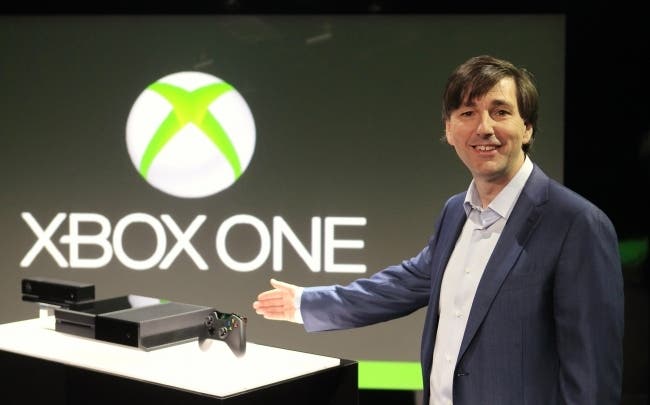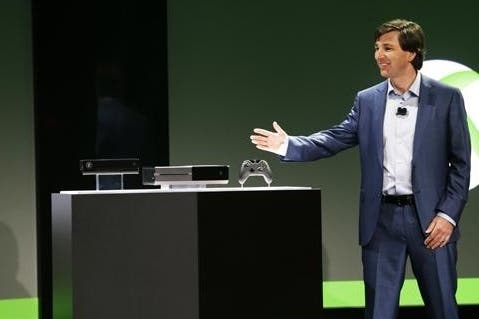Microsoft kills game ownership and expects us to smile
Last time they shipped a console that didn't work by accident. Here's one that doesn't work on purpose.
Almost exactly a year ago, at the end of an E3 press conference in which Microsoft heralded fitness software, Kinect, Internet Explorer, Bing and dying action games as the future of entertainment, I wrote that anyone who has paid attention to Microsoft's business over the years should not be surprised by its apparent lack of self-awareness.
"If we are entertained by what Microsoft chooses to do for its own gain," I suggested, "then that is simply a happy coincidence."
Guess what? The coincidence is over.

The fact that Microsoft's policies governing game ownership, sharing and privacy are not surprising does not make them any less devastating to consumer rights, should they be formally adopted and become a standard. They sacrifice our freedom to own and trade games for no other reason than corporate self-interest.
To save you skimming large tracts of condescending prose about how much Microsoft loves and respects you as a human wallet, here is a summary:
- You do not own the games you buy. You license them.
- Discs are only used to install and then license games and do not imply ownership.
- People can play games installed on your console whether you're logged in or not.
- 10 people can be authorised to play these games on a different Xbox One via the cloud, but not at the same time, similar to iTunes authorised devices.
- Publishers decide whether you can trade in your games and may charge for this.
- Publishers decide whether you can give a game you own to someone for free, and this only works if they have been on your friends list for 30 days.
- Your account allows you to play the games you license on any console.
- Your Xbox One must connect to the internet every 24 hours to keep playing games.
- When playing on another Xbox One with your account, this is reduced to one hour.
- Live TV, Blu-ray and DVD movies are exempt from these internet requirements.
- Loaning and renting games will not be possible at launch, but Microsoft is "exploring the possibilities".
- Microsoft may change these policies or discontinue them at any point.
There is also a promise that Microsoft Studios games will all allow you to trade them in and give them away for free, bringing a whole new emphasis to the expression, "It's the least we could do!"
The only positive thing in the whole document is confirmation that you can turn off Kinect and its data will never be uploaded without your permission. Let us all applaud Microsoft's "OK, fine!" decision not to intrude on our privacy.
The suggestion that these changes to game ownership have been taken to combat piracy or limit the damage that used game sales do to the primary market do not stand up to much scrutiny - at our most charitable, we can say that the data is merely inconclusive, but analysis of other industries that have dealt with these issues for much longer is pretty clear that the overall benefits at least balance out the risks of allowing piracy and used markets to flourish.
The more likely reason for this unprecedented new attitude to console game ownership and sharing is that Microsoft wants to turn its game business into the equivalent of iTunes. The signs are already there in the merger of Xbox, Windows and Windows Phone app stores and the decision to run Xbox games off a Virtual Machine 'game OS' within Xbox One, which could easily be included in new hardware derived from the same architectural roadmap.
This is a neat business way of getting everything to line up. It is done in service to Microsoft's corporate objectives. It is not even done with any particular malice towards you and I. Nevertheless, it signals the most significant divergence to date of Microsoft's goals for the Xbox business from our own. It also puts an unspecified expiry date on every Xbox One game ever made and gives you no control over it. Yes, at a point in time where consoles are becoming less relevant, Microsoft's solution is to make them less permanent.
The addition of cloud gaming functions, the avoidance of DVD or Blu-ray disc access times, the convenience of global access - these are the rewards we are being offered for our complicity in Microsoft's decision to eradicate the concept of console game ownership. They are not good enough and very little ever will be.
Digital marketplaces like Netflix, iTunes and the present Xbox Live are a good thing, but they should be additive. They allow us to form a different kind of relationship with art - a more convenient, expansive and often cheaper one that includes better tools for exploration beyond the borders of our current interest. We should and I do celebrate these things. But a critical reason that I accept them is that I still have the option to own an untouchable physical copy of the things I find there as well.
You can say this is no worse than what Steam does, you can say that it is no worse than what a lot of 'content' companies do, and those statements are true, but they do not engage with the most important detail of this news, which is what we are being told to give up in exchange for this new arrangement: the opportunity to form tangible, lasting relationships with art that matters to us. If you never had that, then why would you miss it? But we do. And soon we won't.
Collectors will still be able to buy Xbox One games on disc, of course, and we may line them up happily on our shelves so that our friends and families can admire our dedication and taste forever more. But under Microsoft's new rules, we are no longer building a collection of games - we are building a collection of loans that may be recalled from us at any time, leaving us with nothing but distant memories. And that loss will be simple, instant and complete.




-3-31-23-screenshot.png?width=291&height=164&fit=crop&quality=80&format=jpg&auto=webp)




